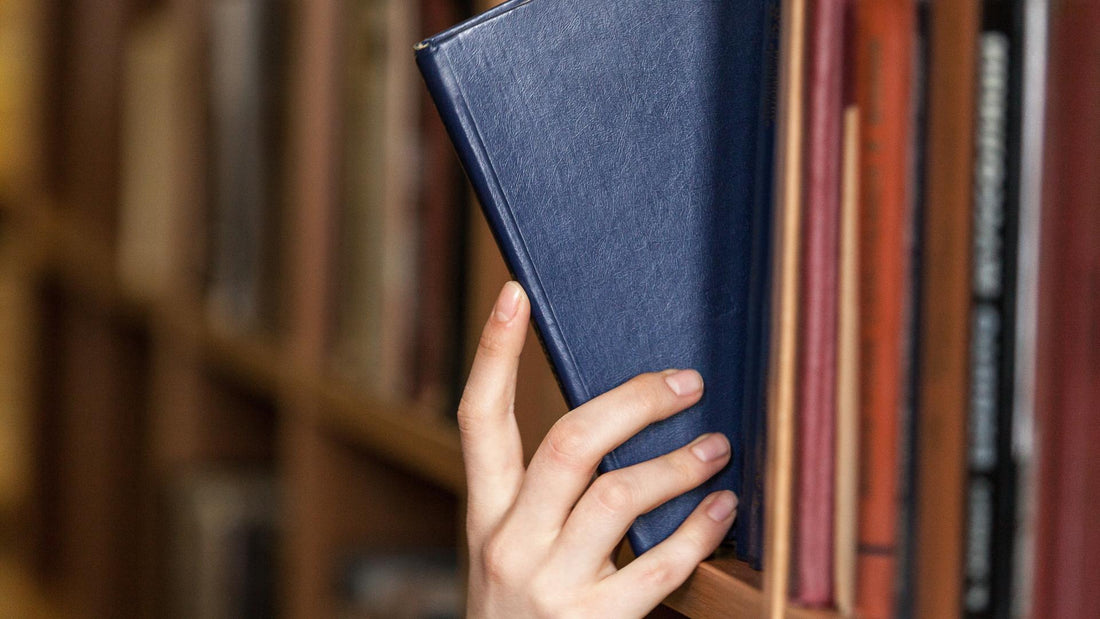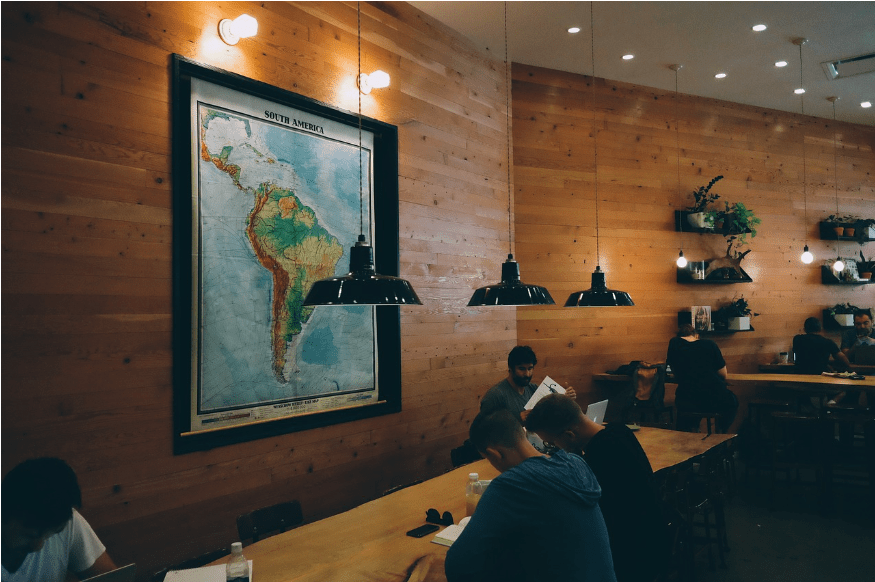
So üben Sie, vernünftiger zu lesen
Aktie
Vom Papier über die Materialressourcen, die zum Drucken physischer Lesematerialien verwendet werden, bis hin zum Energieverbrauch elektronischer Geräte. Für die Produktion von Hunderten von Büchern sind locker etwa ein Dutzend ausgewachsene Bäume nötig. Es gibt also mehrere Möglichkeiten, mit vernünftigeren Methoden weiterhin Freude am Lesen zu haben.
Tipps für eine umweltfreundliche Lektüre

1. Engagieren Sie sich in einem Community-Buchclub
Eine lokale Gesellschaft für Lesebegeisterte und ein lokaler Buchclub können Vorteile bieten, die über soziale Netzwerke hinausgehen. Während die Gesellschaft oder der Club Zusammenfassungen verschiedener Leseerlebnisse teilen, können sie Vorteile durch das Teilen von Büchern bieten. Durch das gemeinsame Besitzen von Lesematerial und das Teilen von Büchern mit anderen wird Platz für Bücher gespart, die Lebensdauer von Büchern verlängert und die Notwendigkeit verringert, in teure Lesematerialkäufe zu investieren.
2. Unbenutztes Lesematerial weitergeben
Das Spenden unbenutzter Bücher, Zeitschriften und Journale ist sowohl für den Empfänger als auch für den Schenkenden eine wohltätige Tat. Erstens nehmen manche Empfänger unbenutztes Lesematerial zum Recycling an. Zweitens müssen manche Empfänger ihre Bücherregale dringend auffüllen. In jedem Fall ist die Weitergabe unbenutzten Lesematerials (egal ob neu oder alt) eine positive Praxis, die sicherstellt, dass kein Abfall entsteht.
3. Entdecken Sie E-Reader und digitale Bibliotheken
Die Nutzung eines digitalen Lesegeräts wie eines E-Readers oder eines Tablets, das für das Lesen digitaler Lesematerialien konzipiert ist, hat einen besseren ökologischen Fußabdruck als die Nutzung physischer Lesematerialien. Viele digitale Geräte ermöglichen den offenen elektronischen Zugriff auf Tausende von Lesematerialien, wodurch das Lesen zudem völlig kostenlos ist. Was Sonderausgaben betrifft, bieten digitale Kopien eine Vielzahl von Leserzugangspaketen, sei es durch ein Abonnement der Datenbank oder eine monatliche Gebühr.
4. Halten Sie gedruckte Bücher regelmäßig bereit
Obwohl für gedruckte Bücher dickeres Material erforderlich ist, sind gebundene Bücher im Allgemeinen vielseitiger und langlebiger als Softcopy-Bücher. Nach dem Kauf hochwertiger gedruckter Lesematerialien in gedruckter Form ist es wichtig, den Zustand und die Gesundheit der Lesematerialien zu erhalten. Halten Sie den Aufbewahrungsort des Buchs, der Zeitschrift oder des Journals von Staub und Feuchtigkeit fern, aber es ist wichtig sicherzustellen, dass Ihre Lesematerialien nicht verfallen oder sich zersetzen. Wenn Sie die Lesematerialien regelmäßig in gutem Zustand halten, verlängern Sie ihre Lebensdauer und stellen sicher, dass sie weiterhin für viele verschiedene Zwecke verwendet werden können.
5. Unterstützen Sie umweltfreundliche Verlage
Viele Verlage weltweit bieten Bücher und Artikel an, die auf Recyclingpapier gedruckt sind und umweltfreundliche Tinten verwenden. Die Entscheidung für nachhaltig gedruckte Bücher oder Artikel sorgt dafür, dass das Lesematerial einen viel positiveren ökologischen Fußabdruck hat. Einige Verlage bewerben Hörbücher auch als nachhaltige Alternative zu physischen oder digitalen Büchern.
Was ist, wenn Sie in einem Unternehmen, einer NGO oder einer Forschungseinrichtung arbeiten?

➡️ Entscheiden Sie sich für den Plan für elektronische Repositorien und Bibliotheksabonnements
Wenn Ihr Arbeitsplatz einem Verlag die Nutzung einer professionellen Lizenz zugewiesen hat, sollten Sie unbedingt direkt mit Ihren Kollegen, dem Wissensmanager oder dem zuständigen Bibliothekar sprechen. Wenn Sie die Initiative ergreifen und sich an Diskussionen beteiligen und aktiv mit Personen interagieren, die mit der Online-Repository-Plattform und der Datenbank des lizenzierten Verlags vertraut sind, kann Ihnen dies erheblich dabei helfen, kontinuierlichen Zugriff auf eine Vielzahl von Ressourcen wie E-Books, Fachzeitschriften, Zeitschriften, Nachrichteninhalte, Monographien, Handbuchreferenzen und andere Lesematerialien zu erhalten, die vom Verlag bereitgestellt wurden. Schließlich bieten die meisten Verlage im Zuge der heutigen Digitalisierung von Leseressourcen eine Vielzahl von Lizenzverträgen und Abonnementplänen an, die auf die Bedürfnisse der Benutzer zugeschnitten sind.
Millionen von Open-Access-Artikeln sind praktisch, überall und jederzeit abrufbar

➡️ Open Access (OA)-Modelle steigern die Leseeffizienz erheblich
Hochwertige Inhalte, die von glaubwürdigen Redakteuren und Fachkollegen im gleichen Wissensgebiet gründlich geprüft wurden, sind oft online zu finden. Diese veröffentlichten Artikel sind für jeden frei zugänglich und haben eine hohe Sichtbarkeit für die Nutzung (z. B. Lesen, Zitieren, Teilen, Selbstausdrucken, Bildung usw.). OA-Artikel enthalten auch dynamische Zusatzillustrationen, Bilder, Abbildungen oder umfangreiche Daten des Autors. Im Vergleich zu Belletristik und Unterhaltungsbüchern, die man in einem typischen Buchladen kaufen kann, sind OA-Artikel hochrelevantes Material, um das eigene Wissen und die eigenen Fähigkeiten zu erweitern und sich mit den beschriebenen Inhalten auseinanderzusetzen. Oft kann ein Leser auch feststellen, dass andere Leser mit einem bestimmten OA-Artikel interagiert oder ihn kommentiert haben. Dieses stärkere Engagement der Benutzer verbessert das Leseerlebnis und die Lesewirkung in gemeinschaftsübergreifenden Bereichen.
➡️ Beteiligen Sie sich an selbstgesteuertem Lernen und teilen Sie Kommentare

Wenn man durchschnittlich 2 Stunden in eine Lesesitzung investiert, kann man viele neue Erkenntnisse und neue Wahrnehmungen über die Erzählungen oder Inhalte der Quelle gewinnen. Ein typischer Leser überfliegt das Buch oft zu schnell, Seite für Seite, und lässt es in einer Ecke liegen, nur um dann festzustellen, dass er versucht, sich an das zu erinnern, was er zuvor gelesen hat. Das unglückliche Szenario ist, wenn wir nicht über solch wertvolle Ressourcen nachdenken und vergessen, Informationen zu verarbeiten, die uns tatsächlich sehr nützlich sein können.
Es ist eine gesunde Übung, nach jeder Lesestunde die Initiative zu ergreifen und 15 Minuten lang zu reflektieren. Dadurch werden nicht nur unsere kognitiven Fähigkeiten gepflegt. Durch das Reflektieren und Kommentieren in einem Notizbuch verbessern wir unsere Fähigkeiten zum Selbstausdruck. Wir können dann entscheiden, welche Inhalte für unsere tägliche Praxis am relevantesten sind. Oder wir können Kommentare teilen.
Empfohlene Materialien zum Lesen:
Während der längeren Arbeitspausen neigen wir dazu, Lesematerial zu erkunden, das neue Informationen liefern kann. Hier sind einige Vorschläge für Bücher zum Thema Nachhaltigkeit und Klimawandel. Das Erkunden dieser Lesethemen und -titel kann Ihr Interesse an dem Thema bereichern. Warum nicht ein paar neue Inhalte zur Unterstützung des Weltalphabetisierungstages besorgen?
📖 Treffen Sie gesündere Lebensentscheidungen, um sich selbst und die Umwelt durch Selbstversorgung zu heilen. „Holistic Homesteading“ von Roxanne Ahern bietet die Werkzeuge für ein langsames, bewusstes und besseres Leben durch Permakultur, Nutzgartenbau und ökologische Landwirtschaft.
📖 Wie wäre es, stolz eine Küchenschürze zu tragen und neue pflanzliche Gerichte zuzubereiten? Erfahren Sie mehr in unserem Artikel, in dem wir verschiedene Bücher bewerten, die Ihnen dabei helfen könnten.
📖 Erinnern Sie sich an unseren letzten Artikel, in dem wir die Bedeutung von Slow Fashion hervorgehoben haben? Und wie wichtig es ist, den Ressourcenverbrauch auf der Erde im Auge zu behalten? Mit über 30 kreativen Ideen und Schritt-für-Schritt-Anleitungen zeigt Ihnen dieses Buch , wie Sie aus einfachen Materialien praktische, umweltfreundliche Schätze für Ihre Küche, Ihr Badezimmer, Ihren Haushalt und mehr machen können.
📖 Sie möchten Ihre Familie vor schädlichen Chemikalien schützen, fühlen sich aber überfordert und wissen nicht, wo Sie anfangen sollen? „Reise in ein schadstofffreies Zuhause“ ist ein praktischer Leitfaden, der Ihnen dabei hilft, schädliche Chemikalien langsam und schrittweise aus Ihrem Zuhause zu entfernen und durch sicherere, natürlichere Alternativen zu ersetzen.
📖 Und folgen und teilen Sie natürlich unserem Blog für Inhalte voller Informationen, Tipps und mehr!
Lesen und Schreiben öffnet „Kopf, Herz und Hand“

Die Theorie „Kopf, Herz und Hand“ ist zu einer berühmten Materialisierung für die Ausbildung von Nachhaltigkeitspraktikern im Bildungsbereich für nachhaltige Entwicklung geworden. Doch heute, da wir weiterhin den Internationalen Tag der Alphabetisierung unterstützen, haben wir viel mehr Raum, um die harte Arbeit vieler Autoren zu würdigen und gleichzeitig aktiver mit Bibliothekaren zusammenzuarbeiten. Es gibt auch viel mehr Raum für uns, mit unseren Kollegen, Chefs, Freunden, Familien und beruflichen Netzwerken Lösungen für einen gleichberechtigten Zugang zu hochwertigen Ressourcen zu finden. Dennoch sollten wir nicht vergessen, dass Alphabetisierung Menschen zusammenbringen, mehr Wissen bereitstellen und positive Handlungen fördern kann.

Hallo, ich bin Ariel Toh. Ich habe an akademischen Instituten eine Ausbildung in Nachhaltigkeitsforschung absolviert und achte bei der Erstellung meiner Artikel auf akribische Details. Durch die Zusammenarbeit mit gleichgesinnten Fachleuten und Unternehmen glaube ich, dass wir „mehr Nachhaltigkeit“ in die Welt bringen können.




